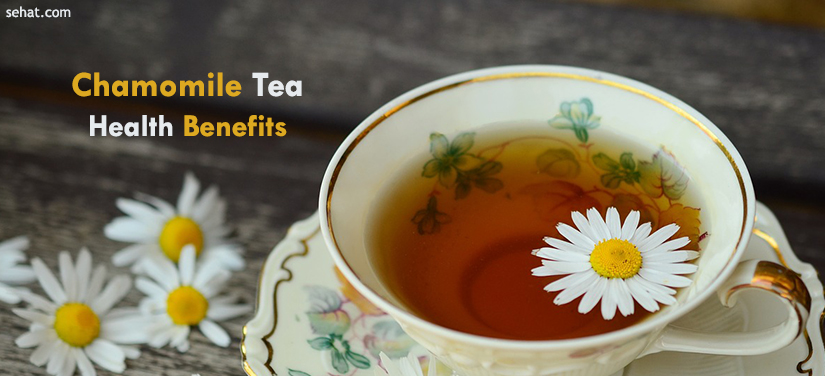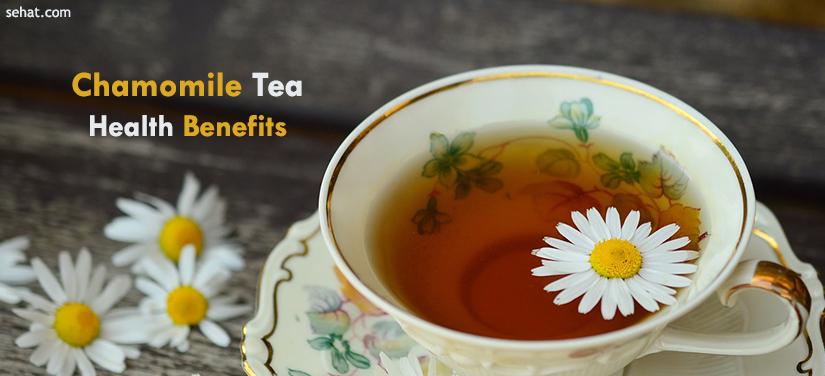How Communities Are Changing the Way We Think About Aging in..
8 Min Read


Have you been asked to refrain from drinking too much tea? If, yes then I am sure “too much caffeine†presence in tea is the reason. Caffeine in tea can cause nervousness, nausea, insomnia as well as irregular heartbeat; and those who sport pearly whites should refrain as tea can stain teeth. Though we know of these drawbacks. other than water, tea is the second most consumed beverage in the world. You can select from different types of teas available such as black, oolong, green and white tea. The caffeine content in each varies; but did you know you can derive health benefits too?
Very few people are aware of the health benefits one can get from tea. One tea type known as Chamomile, is quite popular as it is one of the niftiest and oldest medicinal herbs known to us. Historically this medicinal herb was first used in Egypt, Greece and Rome especially during the Middle Ages. This tea was used to cure various maladies like asthma, nausea, fever, colic, inflammation, skin diseases, to calm down nervousness, as well as cancer by people.
Chamomile is a part of the “Asteraceae†plant family, which looks like the daisy plant. The name itself is derived from French, Latin and Greek sources. Chamomile tea is made from dried chamomile flowers and there are two varieties i.e. German and Roman chamomile that are widely used to produce tea across the globe. However, each variety of chamomile plants is distinct with different growth conditions. For e.g. the Roman chamomile is known as a perennial plant, it has small blossoms and it grows close to the ground. These blossoms are bitter when used in tea. On the other hand, the German chamomile is sweeter, has large blossoms and grows up to 3 feet annually.
Though people have heard about chamomile tea before, proven results of chamomile tea benefits have made people notice it now more than ever. Chamomile tea can be had or applied topically. The chamomile plant is a source of unpredictable oils that include bisabolol, matricinabd bisabolol oxides A and B. It also contains flavonoids especially a complex known as apigeninand other medicinal substances. These ingredients make the use of chamomile plant ideal while treating spasms, allergy, bacterial infections, inflammation, and insomnia.
A number of research studies carried out in the last two decades have reconfirmed a number of its traditional uses, while becoming a viable herb to be used in pharmacological therapeutic products like an antibacterial, anti-spasmodic, antifungal, anti-pyretic, or anti-allergic and is used as a pharma-drug in nearly 26 countries today.
Chamomile tea benefits not only our health but also our skin and hair. Here’s a look at the various chamomile tea health benefits that you should consider
Chamomile tea has a number of flavonoids such as quercetin, apigenin, patuletin as well as glucosides. These compounds curb free radical damage preventing cell mutation which helps to lower inflammation. These antioxidant properties are quite effective in treating stomach and gastrointestinal cramps. Chamomile tea is often recommended as treatment for bowel issues or to provide relief from gas and bloating.
Drinking chamomile tea has been known to relieve menstrual cramps as it has muscle relaxant properties, which help the muscles in the uterus relax and prevent cramps. This tea also increases the glycine levels while help to lower muscle contractions.
Chamomile tea is known as a night-time tea, among tea lovers in the world. This tea works as a mild sedative and is known to cure insomnia and other sleep disorders promoting a good night’s rest. If you have had troubling sleeping, then a hot mug of chamomile tea is what you need to get relief from troubled sleep.
According to research from Alternative Therapies in Health & Medicine and Pharmacognosy Review, “Chamomile, is the best therapeutic herb to fight tension and encourage relaxation in all its forms such as tea, extract or essential oil formâ€. Breathing-in chamomile essential oil vapors is frequently suggested as a natural cure for nervousness and overall despair. This is why chamomile oil is a number of scented candles, aromatherapy products and bath salts.
Chamomile is often used as an essence to lower anxiety and promote serenity as its fumes travel right to the brain’s olfactory part, which works to turn off strain and reduce the body’s response to tension. This makes it one of the best herbal medications to get rid of symptoms of chronic worry and strain, which include panic, hallucinations, sleeplessness and several gastric problems.
We know that smells are often carried to the brain directly, and they can become emotional triggers. Our brain assesses the sensory stimuli of pain, pleasure, safety or danger triggering the body’s response to it in the form of emotions such as fear, anxiety, nervousness or attraction. How we react and our hormonal balance is often in response to a smell we associate with it. These aromas are directly connected to our memories and emotions. This is why chamomile scents are used to relieve pain and affect our character and conduct. Even scientific studies have shown that using essential oil aroma is the fastest way to realize psychosomatic outcomes
Known as a peptic relaxant, chamomile is often used to treat various gastric issues such as gas, chronic acidity, heartburn, anorexia, diarrhea, nausea, motion sickness and even vomiting. Extracts from chamomile can help to curtail the progression of diarrhea and indigestion in children, while relieving indications related to conditions like agony and nervousness. Chamomile tea oil also comprisesof analgesic complexes that curb tremors, reduce cramping, constipation and other abdominal pains.
Chamomile tea benefits include calming effects, which make it a good option for pregnant women. This tea helps to relax the intestinal tract and also acts as a natural preparation for nausea.
Often known as a “herbal aspirinâ€, chamomile tea has been a common household remedy to lower pain for centuries. The chamomile flowers are either used alone or in a mixture with other inflammation reducing foods to decrease pain, congestion, puffiness and soreness. These flowers can effectively reduce facial puffiness, pain caused by infections, skin irritations, toothaches, as well as the causes of swelling. It is one of the most common extracts added to cosmetic products like face mask or body creams, toothpaste, and bath soaps.Chamomile tea also helps to naturally reduce pain related to arthritis, wounds, spinal pain, fever and pregnancy. In fact, its pain-lowering properties are also used to calm the body and mind after giving birth.
A number of recent studies done to study the effect of chamomile tea on cancer have shown positive results in curbing tumor growth. Curbing the growth of cancerous cells is possible due to antioxidants like apigenin present in chamomile, which are bio-active ingredients that seem to fight skin, prostate, breast, ovarian and thyroid cancer.
According to the Journal of the Federation of the American Societies for Experimental Biology, while chamomile tea extracts were able to cause minimum reduction in normal healthy cells, they were able to reduce the number of cancer cells significantly especially the androgen- refractory cells which often cause prostate cancer.
Since chamomile tea benefits include relieving infections and lowering mucus congestion, it is often added as an ingredient to nasal sprays. It is a good choice when you are looking to beat a cold, a sinus infection or even the flu. Research shows that inhaling chamomile vapors helps to cure common cold. There are a few who often rinse with chamomile tea
Chamomile tea is also a good choice when you’re sick and need to get rid of a cold, or the flu or a sinus infection. Studies indicate that inhaling steam with chamomile extract helps relieve causes of cold. You can also use chamomile tea or extract as a mouthwash to fight inflammation of the mucous membranes and within the mouth and throat.
If you are tired of acne, dry, irritated, aging or red skin, then the easiest way to get rid of it is to add a little chamomile tea oil to your lotion. Chamomile helps you get smooth and healthy skin; while it relieves any irritations due to its anti-inflammation and bacteria fighting properties.
The flavonoids in chamomile and its essential oils reach the deeper layers of the skin, conserving the skin’s youthful look, complexion and its immunity. For centuries it has been used to treat wounds, eczema, gout, skin infections, bruises, cancer sores and burns too.
Today people have found that this tea even helps you get rid of signs of aging like fine lines, wrinkles, dark spots; helps to curb dandruff naturally, treat chicken pox and helps reduce scarring. If that’s not enough, you can use it to treat diaper rash or eye infections or sties’

Not only does chamomile tea help to heal skin and our respiratory tract, but it also helps us fight several bacterial infections in the mouth, gums and teeth. Chamomile tea benefits help to lower any pain related to cancer abscesses, injuries and toothaches. They also fight destructive microbes that can live in the oral cavity.
Studies done recently have shown that chamomile can also help to protect our heart. They believe the reason is that chamomile has a high level of flavonoids, which when consumed along with other foods is known to reduce the risk of death from heart diseases in the elderly, especially the men.
Regular intake of chamomile tea, can mollify the stomach ulcer pain. If you have had a surgery recently for kidney stones, then ingestion of chamomile can help to curb reformation of stones.
Chamomile tea has antiseptic properties that help to prevent and treat cold and cough as well as fight any bacteria associated infections and diseases. Consuming chamomile regularly increases your immunity as it helps to protect against several micro organisms
Chamomile tea helps to sustain blood sugar levels, which helps to keep a check on diabetes. However, before consuming chamomile, it is prudent to consult your doctor to understand the required dosage.
Consumption of chamomile tea helps to calm the nerves in our body. Chamomile can also be applied as an ointment on hemorrhoids and wounds.
Chamomile tea has properties that fight against inflammation and spasms. This is why it is often prescribed to help muscles lining the stomach and intestine relax to relieve cramping. This medicinal herb is also used to relieve nausea, acidity, stress related gas and bloating in the gastrointestinal tract. It may also be beneficial in treating diverticular complaints and inflammatory bowel diseases such as Crohn's disease.
Chamomile tea works wonders when it comes to relieving eruptions and other skin allergies. It works exactly like an anti-allergy tablet would, except it is a natural remedy. All you need to do is soak a cotton ball in chamomile tea and apply it over allergy prone areas. Another option would be consuming chamomile tea which helps to calm the body internally, helping you get rid of the causes of an allergic reaction.
Chamomile has been used to treat headaches especially migraines. To get instant relief you can have a mug of hot chamomile tea. You can also mix chamomile tea oil with another oil and massage it on the effected area to get immediate respite.
Sehat provides list of best General Physicians in Delhi from which you can research and choose the right doctor for your condition